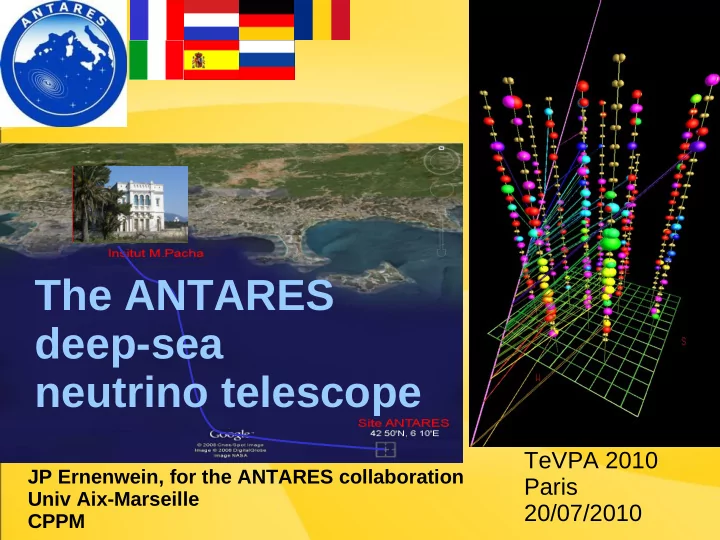

The ANTARES deep-sea neutrino telescope TeVPA 2010 JP Ernenwein, for the ANTARES collaboration Paris Univ Aix-Marseille 20/07/2010 CPPM
µ ν Neutrino Principle & Physics Supernovae Oscillations Dark Matter Astrophysical neutrinos Fast short muon path GZK, topological defects decrease weak light of 40 K fluxes MeV GeV TeV PeV EeV E -2 , E -3
Potential sources of neutrinos Microquasar Active Galactic Nuclei 1 a.l. 1 a.l. M 87, HST SNR RX J1713.7-3946 Aharonian et al, A.A. 449 (2006) 223-242 Gamma Ray Bursts SNR Dark Matter Exotic physics Pulsars Magnetic Monopoles Nuclearites
ANTARES 2475m, floor 3 PMT/floor 12 lines of 25 14.5 m floors 885 PMTs 350 m Cable to shore station (Toulon, France) ~40 km 100 m Junction box 70 m
Optical Module floor 10” PMT JUNCTION box Connection of a line
2005 2006 2007 2008 Mar: Mar: Sep: Jan : Dec: Jun: MILOM L1 L2 L3-5 L6-10 L11,12 MILOM IL07 Connection of lines recovery N IL07 L1 L5 L2 L3 L9 L4 L7 L6 L8 L11 Câble L10 sous marin L12 (vers la côte) sismomètre 100 m Boîte de jonction
Detection 3D matrix principle shower good Cherenkov energy light ( µ) resolution γ č Dynamic range : 20pe/40ns ( O (30%)), ν e poor threshold ~1/3 pe required angular sensitivity: resolution photo-electron ( O (10°)) 1 photo-electron 42° 1 2 4 5 6 7 8 9 10 0 3 2475 m µ Charged current Measurements interaction track: time ( O (ns)), amplitude (30%) (W) & hit position( O (10 cm)) Good angular resolution ν µ (~0.3 degrees @ E>10 TeV), Muon track or shower Poor energy resolution (factor measurement 2-3)
Signal & Down going background events (atm muons and background muons from neutrinos) p, α atmosphere Up going background µ sea (muons from neutrinos) ν µ p 10 -7 d Φ /d Ω cm -2 s -1 sr -1 Atm muons Profondeur 2400 m E > 1 TeV µ 10 -9 10 -11 10 6 Cosmic Muons from neutrinos atm neutrinos 10 -13 10 -15 ν µ γ 10 -17 cos θ µ
Atmospheric muons & neutrinos
Neutrino Candidate (up-going muon) χ 2 method (no alignment) Z hit PMT (m) bullet= hit triggering the event Time (ns) Square= hit in the fit
Muon bundle (down-going event) χ 2 method (no alignment) Z hit PMT (m) bullet= hit triggering the event Time (ns) Square= hit in the fit
5-line data (May-Dec. 2007) + 9-12 line data (2008)= 341 days detector live time DATA Upgoing: 1062 neutrino Monte Carlo: candidates: atmospheric 3.1 ν candidates/day neutrinos: 916 (30% syst. error) Wrong reco atmospheric µ : 40 (50% syst. error) Elevation(°)
Scrambled ANTARES Sky map of 1000 ν Galactic Coordinates
Muon depth-intensity relation µ µ Equivalent depth
Electromagnetic showers induced by atmospheric muons Muon(s) down-going event Z hit PMT (m) Time (ns)
Electromagnetic showers induced by atmospheric muons Muon(s) down-going event Z hit PMT (m) Time (ns)
Electromagnetic showers induced by atmospheric muons Sensitive to primary Preliminary
Ongoing combined searches • Receive GRB alerts from Satellites search for coincident neutrinos within time window (~100 s) • Send neutrino cluster alert for optical follow-up Trigger: multiple or ”HE single” neutrino event; Reconstruction “on-line” (<10ms). Alert message to T arot T elescope in La Silla and to the ROTSE system (4 telescopes) • Correlation with AUGER source distribution investigate directional correlation of neutrinos and UHE particles • Correlation with VIRGO-LIGO signals investigate correlation of neutrinos and gravitational waves
Point source search DATA on 5 lines (2007) 140 days equivalent
Events Events ~ Track Track energy quality Number χ 2 of hits Events Event Zenith reconstruction distribution and selection
Selected neutrino Candidate (up-going muon)
Selected events Declination distribution limit No significant excess neither in all-sky No significant excess neither in all-sky search nor in selected source directions. search nor in selected source directions. Sky map See next talk (JDD Zornoza) Point spread function of the reconstruction used in this analysis ( χ 2 ) Blue: selected Galactic sources from catalog coordinates
Diffuse flux of muon neutrinos DATA on 9-10-12 lines (Dec. 2007, 2008, 2009) 334 days equivalent
Energy estimator µ direct photons + µ scattered photons + light from EM showers Energy estimator= Repetition (R) of integration gate on the same Optical Module Cut optimized by MRF method on MC
Diffuse ν µ flux – Upper limits (E -2 ) 334 days 9 observed events for 10.5±2 expected background E 2 Φ (E) 90% = 4.8×10 -8 GeV cm -2 s -1 sr -1 20 T eV<E<2.5 PeV
Magnetic Monopole search DATA on 9-10-12 lines (Dec.2007-2008) 116 days equivalent
Reconstructed β Reconstruction: Same as for muon studies but velocity β is a free parameter. Reconstruction of trajectory + velocity . Selection of high energy up-going events: Above Cherenkov threshold: large amount of light (~8500 more photons than for a muon) Below Cherenkov threshold: Delta rays (from β ~0.55) DATA/MC comparison before unblinding (small sample) Direct Cherenkov γ from a MM with g from g=g D . MM 0 0 5 8 x Cherenkov γ from delta-rays. g from g from d-rays m Cherenkov γ from a µ .
Simulated MM (beta=0.7) Z hit PMT (m) Time (ns)
Expected sensitivity for 116 days (90% C.L.) Preliminary unblinding in progress
Dark Matter search
χχ 3° half aperture cone Background: ν ~7 events/3 yrs Atm. ν bkg µ Atm. µ bkg misreconstucted (10% of ν )
3 years, 12 lines mSugra parameters
Summary, outlook ● Antares is taking data since 2007 in its different configurations (5, 9, 10, 12 lines) ● The detector and its environment are now well understood: good agreement DATA/MC ● First physics results are now available after unblinding: Point sources for the 5-line stage, Diffuse Fluxes ● For other topics the unblinding is in progress (Magnetic Monopoles) or the studies are on-going (Point sources with more than 5 lines, showers)
Recommend
More recommend